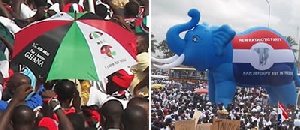The ruling National Democratic Congress (NDC) and the main opposition New Patriotic Party (NPP) were on Tuesday blamed for the low women representation in Parliament since the inception of the fourth republic.
“Being the two dominant political parties which has alternated power since 1992, their conduct in selection of Parliamentary candidates reflects on their real posture on affirmative action.
“The grounds for conducting parliamentary primaries is slanted against women, right from the composition of delegates, to officials conducting the elections...if the two parties want us to have more women in the next Parliament it’s a done deal, even if they want us to have a woman President but in reality they are not,” Mr. Kwesi Jonah, a senior fellow of the Institute of Democratic Governance (IDEG) stated in Accra.
Mr. Jonah who chaired and launched an 88-page Election 2012 campaign tool kit titled: “Election 2012-Matters of concern to the Ghanaian Voter,” a comprehensive survey conducted by the National Commission for Civic Education (NCCE), charged the two parties to demonstrate their commitment to affirmative action.
He said if the NDC and NPP allocates about 25 per cent of their parliamentary seats to women; “the next parliament will have fair gender representation.
Mr. Jonah, who also reviewed the research report, appealed to politicians take notice of the importance of the report, to yield a better turn out. He also urged voters to consider the vision and policies of political candidates and not to vote out of their loyalty to a particular party.
He also said the research report is an accountability tool for every voter to analyze the policies and manifesto that political candidates present to them.
“Education is the major concern of voters in the Greater Accra, Western, and Ashanti, the three least poor regions whereas agriculture is the priority of the three poor regions in Ghana”
Mrs Charlotte Osei, NCCE Chairman, called on political parties to consider the views and priorities of the electorate when preparing their manifesto and agenda.
She said politicians should address the concerns of voters based on gender, age, religion, and geographical location especially as their priorities on education, health and employment vary.
Presenting the survey findings, Mrs Gertrude Zakariah-Ali, NCCE Director of Research, Gender and Equality; explained that the purpose of the survey was to identify important matters of concern to the Ghanaian voter in respect of the impending December elections.
She said four electoral areas were selected from each of the 230 constituencies through a combination of purposive, quota and random sampling in each constituency.
She said a total of 7,497 persons responded to the questionnaire, whilst a small number of 39 persons included in the sample did not respond. On social-demographic characteristics of respondents, the statistics indicates that out of 7,497 persons who responded to the questionnaire, 3,782 representing 50.4 percent were female and 3,665 representing 48.9 percent were male.
Mrs Zakariah-Ali explained that persons aged between 21 to 30 constituted the highest number 2,107, representing 28.8 percent of the age group of respondents; 31 to 40 constituted 1,892 representing 25.2 percent; whilst the largest proportion of the respondents 2,924 representing 39.5 percent had basic education as their highest attainment.
In terms of occupation, majority of respondents were either traders or farmers... “Of the 7,497 respondents, 1,511 representing 20.1 percent were engaged in trading as their dominant occupation, and farming was the next occupation of importance as 1,492 representing 19.9 percent were engaged in it.
The data also indicates that 82 percent of all the respondents who were into trading were women, whilst more than half 59.9 percent of all unemployed respondents were women.
In terms of marital status, 56.3 percent of respondents were married; 30 percent single; 5.3 percent widowed; 3.8 percent divorced and 3.5 percent separated.
In terms of religion, 75.5 percent were Christians; 19.4 percent Moslems and 3.5 percent traditionalists affirming the belief that Ghanaians are God fearing or at least believers.
The NCCE Campaign tool kit was launched by Professor Ivan Addea-Mensah, former Vice Chancellor of the University of Ghana and was attended by leading members of the NDC, the NPP, civil society activists, media practitioners, and a cross section of the public.
Politics of Wednesday, 29 August 2012
Source: GNA

















